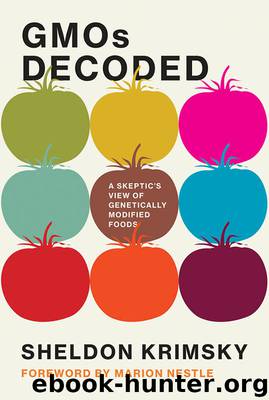GMOs Decoded by Sheldon Krimsky

Author:Sheldon Krimsky
Language: eng
Format: epub
Tags: molecular breeding; genetically engineered crops; herbicide resistance; insect resistance; recombinant DNA; Bt crops; Monsanto; Sustainability; genetically modified organisms; CRISPR; FDA; organic; labeling; frankenfoods; non-GMO; National Academies; glyphosate; antibiotics; substantial equivalence; Bt resistance; epigenetics; intellectual property; pathogen-derived resistance; genetic selection; pesticides; artificial pollination; backcrossing; mutagenesis; hybridization; transgene; gene cassette; marker gene; promoter gene; cisgenesis; synthetic DNA
Publisher: The MIT Press
9 Contested Viewpoints on the Health Effects of GMOs
Thus far, I have explored the mainstream scientific literature on the principles of traditional and molecular breeding, pointing out where there are contested viewpoints. I have discussed how the methods of breeding may introduce unintended effects and questioned whether molecular breeding introduces any unique health or environmental impacts from the crops produced and foods derived from them. Looking into competing scientific interpretations may help to explain why there are wide divisions in society over GMOs. It is too easy to say that one group follows the science and the other group follows an ideology. That leads some observers to embrace the idea of “GMO deniers,” referring to people who leave the science behind in favor of an irrational (or groundless) opposition to genetically modified food. But there is a scientific record of studies that support honest skepticism. Also, European and American scientists see the issues and the risks differently, which can explain why their respective regulatory systems are distinct.
In this chapter, I explore contested principles held by scientists that reflect not so much different interpretations of the same science but rather alternative presuppositions about how to apply the knowledge of plant genetics to the questions of risk and why scientists may reach different conclusions. There is a great deal that plant biologists agree upon, which is covered in the previous chapters. Here I focus on principles or conclusions for which there is lack of consensus—at least among certain groups of scientists. By focusing on the contested interpretations of general principles, I will be able to highlight the locus of disagreement.
Download
This site does not store any files on its server. We only index and link to content provided by other sites. Please contact the content providers to delete copyright contents if any and email us, we'll remove relevant links or contents immediately.
Craft Beer for the Homebrewer by Michael Agnew(18245)
Marijuana Grower's Handbook by Ed Rosenthal(3682)
Barkskins by Annie Proulx(3371)
Project Animal Farm: An Accidental Journey into the Secret World of Farming and the Truth About Our Food by Sonia Faruqi(3221)
The Plant Messiah by Carlos Magdalena(2934)
Red Famine: Stalin's War on Ukraine by Anne Applebaum(2933)
0041152001443424520 .pdf by Unknown(2845)
Organic Mushroom Farming and Mycoremediation by Tradd Cotter(2691)
In the Woods by Tana French(2598)
Beer is proof God loves us by Charles W. Bamforth(2461)
7-14 Days by Noah Waters(2419)
Between Two Fires by Christopher Buehlman(2363)
Borders by unknow(2313)
Reservoir 13 by Jon McGregor(2302)
Meathooked by Marta Zaraska(2260)
The Art of Making Gelato by Morgan Morano(2255)
Birds, Beasts and Relatives by Gerald Durrell(2228)
The 7 Habits of Highly Effective People: Powerful Lessons in Personal Change (25th Anniversary Edition) by Covey Stephen R(2205)
The Lean Farm Guide to Growing Vegetables: More In-Depth Lean Techniques for Efficient Organic Production by Ben Hartman(2136)
